- Home
- Christie Golden
Allies Page 5
Allies Read online
Page 5
Real help had come from an unexpected, but welcome source. Jaina Solo had come to visit her two days ago, smiling as she told Tahiri that “someone was able to find a good representative for you.” The someone, of course, had to be Jagged Fel, and the knowledge, like the willingness of the Jedi to support her, had surprised and touched Tahiri.
This new attorney would be arriving at any minute. She knew that he had once been highly respected, but had retired some years ago. That he was a Bothan named Eramuth Bwua’tu. She wondered if he was any relation to Admiral Nek Bwua’tu. There was a lengthy list of cases he had won, but she had no way here to research them, and they had all transpired before she’d even been born. She wasn’t sure what to expect.
The door swung open and she stood, her heart beating slightly faster. Tahiri, don’t, just don’t, don’t hope too much—
She blinked. He was, without a doubt, the most elegant being she had ever seen.
Taller than most Bothans, and very thin, he looked like he had stepped out of another era. His fur was dark brown and sleek, though it was thinning slightly with age. Around his muzzle and cheeks, it was snowy white, in stark contrast with the brown, and perfectly groomed. He extended a hand to her, and she took it, noting that he wore gloves.
The rest of his attire was equally as formal. A small, oddly jaunty hat sat between his two ears. His vest, long coat, and trousers looked perfectly tailored, the coat fitting his narrow shoulders, the trouser creases knife-sharp. His boots gleamed, and he sported a cane, black and simple, but with a stylized handle sporting the finely carved head of some animal Tahiri did not recognize. In the same hand he had a small black bag that looked to be made of nerfhide.
“Eramuth Bwua’tu, Esquire,” the dapper being said. His handshake was firm, but not too much, and he looked her right in the eye in an interested manner. His voice was deep and mellifluous and resonant. Tahiri could just imagine it carrying in a court of law, with Eramuth crying out something like “I object!” or, more floridly, “Beings of the jury, search your hearts for justice!”
“Tahiri Veila,” she managed. A small smile played at the corners of her mouth. Why?
“I’ve been asked to represent you,” Eramuth continued. “Please, miss, do sit down.”
“I’d rather stand.”
He smiled. It was utterly charming. With a rueful shake of the cane, he said, “Ah, but I’m afraid that I would rather sit, and good breeding forbids me doing so unless you do.” He winked.
Tahiri sat. Again, she fought the urge to smile.
“Thank you, my dear,” Eramuth said, putting a hand to his heart and bowing ever so slightly before pulling out a chair for himself. With anyone else, Tahiri would have thought it a calculated, over-the-top gesture. But with him, it seemed completely natural. There was a grace to him, not just of mannerisms or clothing, but somehow simply emanating from who he was.
Hope started gnawing on her like a mynock on a power cable. She pushed it down, ruthlessly.
“Are you related to Admiral Nek Bwua’tu?”
He gave her another quick smile, focusing the full force of his attention on her. “Indeed I am. He’s my nephew. He’s done the family proud. Unlike his notoriously eccentric uncle.”
He was still smiling, but Tahiri’s slightly giddy feeling of hope suddenly turned cold. “Eccentric uncle?” It would be just her luck, she thought, to have landed a madman for an attorney.
“Only in Bothan circles,” Eramuth said. “Are you familiar with our culture, my dear?”
Normally, the endearment would have annoyed her, but she sensed only kindness. “Well, I don’t want to stereotype, but your people are known for political … um … maneuvering.”
He chuckled. It was a warm, rich, happy sound, and Tahiri instantly wanted to hear it again. “You’ve the makings of a diplomat.”
“Oh, trust me, not really.”
“Let me put it this way. Sometimes certain clans want certain outcomes in trials. Sometimes that means a verdict of not guilty for my client … which, of course, I desire as well, providing I believe that said client is, in truth, not guilty. I’ve never taken on a case where I don’t believe, with my whole heart, that that being is truly innocent. And I can assure you I never shall.”
His voice rose with the passion of his beliefs, and his face went from pleasant to intense and righteous. Tahiri stared at him. She felt a strange catch in her throat and the hairs at the back of her neck rose.
“I am, however, enough of a son of Bothawui to want to be on the winning side.” He gave her a somewhat abashed smile. “I do not take on cases I believe I cannot win. And most certainly, I would not come out of retirement and leave my comfortable professorial position for one.”
“That’s … very comforting to know.”
He beamed at her for a moment, reached across the table and patted her hand, then turned to business. He pulled off his gloves with quick, precise movements, opened the case and pulled out—
“Flimsi?”
“Of course.” He reached into the bag and pulled out a datapad. “I do have datapads, my dear. Never fear, I’m not entirely out of date. I simply prefer to have the feel of something a little more permanent in my hands. Data can be erased. Ink … is a little harder.”
He handed her one of the datapads. “All the information on your case is there. I have the same documents here,” and he indicated the flimsi, “all written down in that ink I so love. We can go through it together.” Eramuth shuffled through the papers, carefully setting aside a blank piece and a writing instrument.
“Now, my dear,” he said, looking at her kindly. “Tell me everything.”
OFFICES OF THE CHIEF OF STATE, CORUSCANT
“TAHIRI VEILA HAS ACCEPTED AN ATTORNEY FOR HER DEFENSE,” WYNN Dorvan was saying. He sat across the desk from Chief of State Natasi Daala at their daily morning briefing and politely refused a cup of caf she offered him. His pet chitlik, Pocket, was curled up in the part of his jacket for which she was named. The room was tidy and gleamed in black-and-white, evocative of the old Empire of which Daala had once been a part and for which she obviously still harbored nostalgic fondness.
“Good,” Daala said. “She’ll need one since she forced our hand.”
Dorvan suppressed a sigh of irritation. He had not approved of Daala’s initial plan to deal with Tahiri. The GA had brought charges of treason and murder against the former Jedi, an accusation which, if she were convicted, could mean the death sentence. Daala had sent in a negotiator to speak with Tahiri’s attorney and offered her a quiet under-the-table deal. If Tahiri were to spy on her fellow Jedi and report back to Daala, the charges would be commuted.
It was not the sort of thing the GA should be doing, in Dorvan’s opinion. Spies were one thing. Dorvan completely accepted the necessity of espionage, but this was something else entirely. This was betrayal and backstabbing on the part of someone who had been attempting to move her life away from that sort of direction. He had found himself quietly admiring Tahiri for refusing both the deal and the advocate who had brought it. It was not good for the GA, but he could respect it.
A fair trial would, on the other hand, be quite good for the GA. And that was a point Dorvan planned to press today. Again.
“Who did she get?” Daala continued.
“One Eramuth Bwua’tu, uncle to Admiral Nek Bwua’tu. He has quite a reputation as a lively and fierce defender of his clients, but he has been retired for some time. He currently is a professor.”
Daala paused in mid-sip. “You’re teasing me.”
Dorvan looked up and blinked at her. “Ma’am, I’m offended. I would not joke about something of this nature.” Dorvan seldom joked about anything, but when he did it was dry, acerbic humor usually about something of no real importance. Pocket sensed his annoyance and shifted position, a warm, soft weight against his hip.
“Quite true. That makes this even more amusing. Admiral Bwua’tu and I are pretty close.”
�
�Eramuth Bwua’tu has a reputation for being incorruptible,” Dorvan continued. “Admittedly, that is an unusual characteristic for a Bothan, but it is in the rather exhaustive notes that Desha has compiled for me.”
Desha Lor was the overly ebullient young Twi’lek that Daala herself had assigned to him. She was impossibly naïve and quite idealistic, and Daala was not at all surprised that she had seen fit to include such a comment in her notes.
“Not really a cold, hard fact about the man, is it?” Daala was no longer amused.
“No, ma’am. But perhaps you might have thought about Desha Lor’s predilections prior to hiring her as my assistant. Now we both must learn to live with the consequences of such a decision.”
The smile returned for a moment. Few could be as blunt with the Chief of State as Dorvan. She had a vast tolerance for his honesty, choosing to value it rather than let it rattle her. He never abused the privilege, but it was a tool in his arsenal in order to get done what he believed was best for the GA.
“Point taken. Still, moral attorney or no, Veila’s got about as much chance of being found not guilty as an eopie has of surviving being dropped into a rancor pit.”
Daala seemed absolutely sure of the fact, and Dorvan was inclined to agree. While one might feel a certain amount of sympathy for the girl, one didn’t pardon someone simply because one felt sorry for her. Tahiri had coasted for the last year because Daala hadn’t wanted to pursue the matter. She had spent the time stabilizing the Galactic Alliance after what Jacen Solo had done to it. Dorvan had approved of her decision to focus on healing. The GA had benefited greatly. But now Daala was going after those she perceived as enemies both of herself and of the GA. First Luke Skywalker, and now Tahiri Veila.
Daala had appointed Sul Dekkon, a famous—some would say infamous—Chagrian lawyer who had a reputation for going after a case the way a Kowakian monkey-lizard went after a bad joke. Known for being a stickler for doing things by the book and adhering to the letter of the law, Dekkon was a good choice as far as Dorvan was concerned. Tahiri would need someone equally powerful in order for the trial to do what a trial should do—look at the evidence impartially, and make a decision not based on anyone’s need for a particular outcome.
Not even Natasi Daala’s.
And fortuitously enough, it was Daala herself who had given Dorvan the perfect opening.
“The case against her is quite strong, and Dekkon will do a fine job,” Dorvan said. “That being so, ma’am, I wonder if you see the real opportunity here.”
Her red brows came together in a frown. “Explain.”
Dorvan leaned back in his chair, folding his hands across the datapad, and looked the Chief of State right in the eye. “You’ve just stated that Tahiri is certain to lose this case. Barring unforeseen developments—and frankly, ma’am, with you the chance of anything being unforeseen would be extremely rare indeed—I agree. This certainty gives you the chance to spin this to the GA’s advantage.”
“Go on.” Daala’s green eyes were fixed on his even as she reached for her cup and took a sip of caf.
“My recommendation to you would be to abolish the special Jedi court. Let Tahiri be tried and, as everyone, including Veila and her attorney must know, most likely be convicted in the same court as anyone else. It would demonstrate that while the Jedi get no special privileges, neither do they have special handicaps.”
The piercing eyes narrowed. “Not you, too.”
Dorvan blinked, which for him was demonstrating a great deal of surprise. “I beg your pardon?”
“Head of State Fel has been after me to do that exact thing.” Daala sighed and stared irritably at her caf for a moment. When she did not immediately continue, indicating she was willing to listen, Dorvan went on.
“Unfortunately, the incident with former Judge Lorteli did harm us in one court—that of public opinion.”
Daala almost, but not quite, winced. It was a sore spot with her. Judge Arabel Lorteli had been appointed as the chief judge of Daala’s special Jedi court. Dorvan disliked using the word corrupt, but Lorteli was certainly eager to do all she could to appease the woman who had given her the job. Such eagerness usually did not go hand in hand with a strong sense of will, and the Jedi had taken advantage of it. No one knew for sure if they had used the infamous Jedi mind trick on Lorteli or if they had just managed to sweet-talk her, but the end result was the same.
It had been Daala appointee Judge Arabel Lorteli who had signed the writ permitting Corran and Mirax Horn to visit their children at the Palem Graser Office Tower. What had transpired had not quite been a public relations disaster, but had certainly complicated Wynn Dorvan’s day. Brandishing the writ, and with a pack of voracious newshounds, including the ubiquitous and despised Javis Tyrr, capturing every moment, Jaina Solo and several other Jedi had entered the building demanding to see Valin and Jysella Horn.
The two Horn siblings had indeed been found—hanging like wall art in the executive offices of one Colonel Wruq Retk, a Yaka who was in command of the facility that amounted to a not-so-secret secret prison. An outraged Mirax had punched the Yaka, Daala had been forced to do some instant backpedaling, and subsequently and publicly had dismissed Lorteli. Since that time, her position had remained vacant, and the special Jedi court had been inactive.
“The timing is excellent,” said Dorvan. “It’s been technically inoperative since the incident anyway. Having this trial take place within the regular court system would place you above any hint of scandal, even make you look sympathetic. To my mind, ma’am, there is no downside. Either Tahiri will be found guilty, and thus be subject to what the law decrees as proper punishment, or in the unlikely case that she is found not guilty, both you and the GA will come out looking like you have done the right thing, accepting this particular defeat with grace and aplomb.”
“Tahiri Veila killed Gilad in cold blood,” Daala stated coldly. “She deserves to be punished for what she’s done. Others certainly have.”
Dorvan knew that Daala was still upset about Admiral Cha Niathal’s suicide. He knew why she wanted Tahiri Veila to suffer. She had not wanted to bring charges against the Mon Calamari, but had done so, ironically, in an effort to appear evenhanded. For Dorvan to ask her again for an appearance of evenhandedness specifically directed at Tahiri Veila was pushing it, and he knew it.
Niathal had taken an ancient and honorable way out for those facing political ruin—she had taken her own life in a time and place of her own choosing. It was distressing, certainly, but he suspected that Daala was perhaps taking the suicide—taking everything surrounding the case—much too personally.
“Ma’am, if I may … I understand that Gilad Pellaeon was a personal friend of yours. And I cannot help but observe that Admiral Niathal’s suicide has caused you some distress. But you should not let this become, or at the very least not let it be perceived as, a personal vendetta.”
Her patience with him seemed to have reached its limit, for Daala snapped, “Niathal paid the price for aiding Jacen Solo and she didn’t even pull the trigger. Veila should, too. Murdered is murdered. It doesn’t matter if Pellaeon was an old friend, an old enemy, or someone I’d never met.”
Unruffled, Dorvan nodded his brown head. She had him on the last point. Daala folded her arms, thinking.
“If I did this,” she said, “the Jedi would think of it as a concession.”
“Perhaps,” Dorvan said. “One for which they might be very grateful.”
“Or one that might make them smug and think they’d scored a point.”
“Pardon me, ma’am, I had thought we were trying to do what was best for the Galactic Alliance and its people, not participating in a game of sabacc.”
To his surprise, Daala smiled slightly. “Politics is always a game, Dorvan. You’ll need to learn that one of these days.”
“I hope not, ma’am. I’ve a dreadful sabacc face.” He said this with his usual deadpan voice, and that actually got a chuckle out of the Chi
ef of State.
“Let’s say you’re right,” she continued. “Let’s say they’re grateful. Perhaps they might be willing to give me something in exchange. Say … Sothais Saar.”
Sothais Saar was the latest “Jedi crazy,” as the press sometimes liked to call them. He was a Chev, tall, powerful, and, like all the “Jedi crazies,” extremely dangerous. And he was currently in the Jedi Temple, and nothing that Daala had been able to say or do had persuaded Master Kenth Hamner to release him.
“It’s possible,” Dorvan said. “It would certainly put you in a stronger negotiating position. And ma’am?”
She glanced at him. “Yes?”
“Quite frankly, it’s the right thing to do, and you truly lose nothing.”
She sighed. “I will think about it. Anything else?” The clipped, cool tone of her voice told him she hoped there wouldn’t be.
He would have to disappoint her. “Well, this is probably nothing of import but …”
“Then you wouldn’t mention it,” Daala said. “I know you too well.”
“Well, ma’am, that much is true. It seems that there have been some uprisings and protests on various worlds.”
“Uprisings and protests? Against the GA?” Daala sat up straighter, her brilliant emerald eyes narrowed to slits, her body as still and taut as a predator on the alert.
“No, ma’am. All localized incidents. Suppression of religion, unfair representation, a history of slavery that the suppressed populace has decided is outdated. That sort of thing.”
She extended a well-manicured hand for the datapad and he gave it to her. “Mostly backwater worlds,” she said after perusing it quickly.
“Hence my initial hesitation in bringing this to your attention. However …”
“Such things can be like wildfires,” Daala agreed. “If one revolution is successful, another world might take heart and try their own.”
“Precisely. And as the Galactic Alliance denounces slavery, I felt it was the right thing to do to mention the situation.”

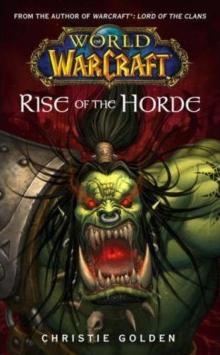 Rise of the Horde
Rise of the Horde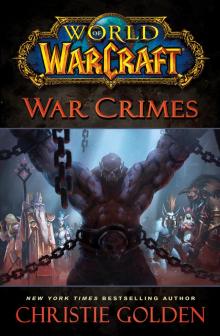 World of Warcraft: War Crimes
World of Warcraft: War Crimes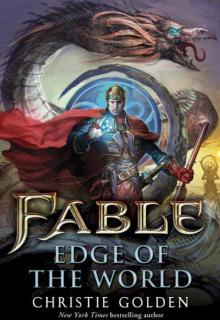 Fable: Edge of the World
Fable: Edge of the World Homecoming
Homecoming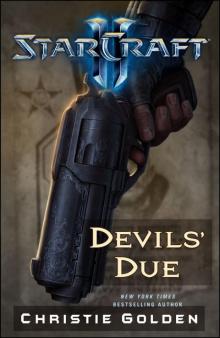 StarCraft II: Devil's Due
StarCraft II: Devil's Due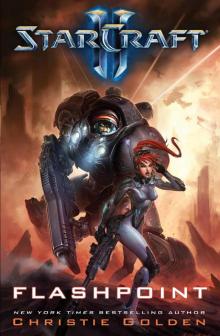 Starcraft II: Flashpoint
Starcraft II: Flashpoint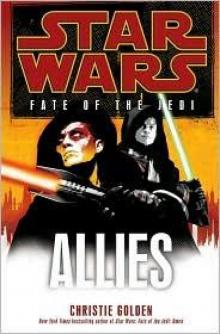 Allies
Allies Shadow Hunters
Shadow Hunters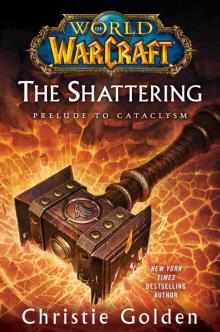 The Shattering: Prelude to Cataclysm wowct-1
The Shattering: Prelude to Cataclysm wowct-1 STAR TREK: VOY - Homecoming, Book Two - The Farther Shore
STAR TREK: VOY - Homecoming, Book Two - The Farther Shore King's Man and Thief
King's Man and Thief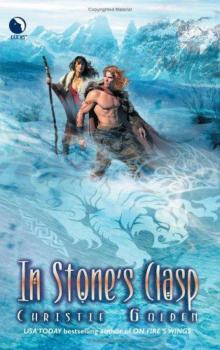 In Stone's Clasp
In Stone's Clasp Jaina Proudmoore: Tides of War
Jaina Proudmoore: Tides of War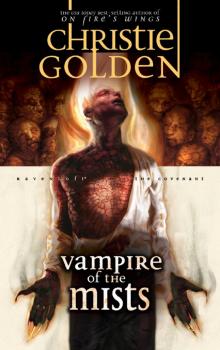 Vampire of the Mists
Vampire of the Mists Star Wars: Fate of the Jedi II: Omen
Star Wars: Fate of the Jedi II: Omen King's man and thief cov-2
King's man and thief cov-2 Star Trek
Star Trek StarCraft: Dark Templar: Twilight
StarCraft: Dark Templar: Twilight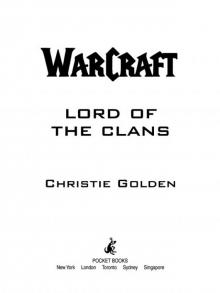 Lord Of The Clans
Lord Of The Clans ARKTIKA.1 (Short Story)
ARKTIKA.1 (Short Story)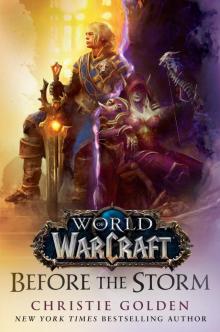 Before the Storm
Before the Storm STAR TREK: VOY - Homecoming, Book One
STAR TREK: VOY - Homecoming, Book One Shadow of Heaven
Shadow of Heaven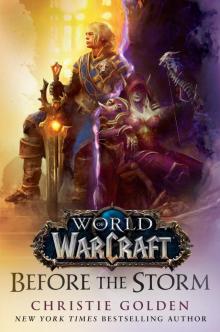 Before the Storm (World of Warcraft)
Before the Storm (World of Warcraft) Warcraft Official Movie Novelization
Warcraft Official Movie Novelization Flashpoint
Flashpoint STAR TREK: The Original Series - The Last Roundup
STAR TREK: The Original Series - The Last Roundup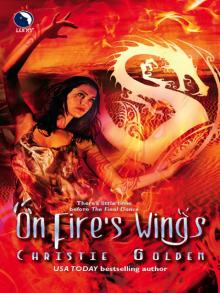 On Fire’s Wings
On Fire’s Wings Spirit Walk, Book One
Spirit Walk, Book One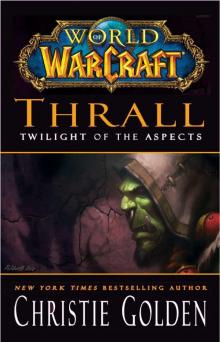 Thrall Twilight of the Aspects
Thrall Twilight of the Aspects Valerian and the City of a Thousand Planets
Valerian and the City of a Thousand Planets Warcraft
Warcraft Assassin's Creed: Heresy
Assassin's Creed: Heresy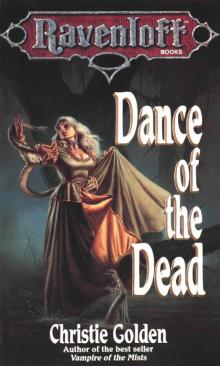 Dance of the Dead
Dance of the Dead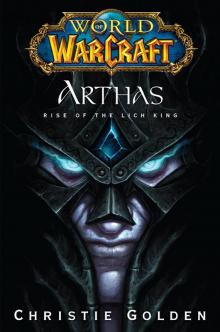 Arthas: Rise of the Lich King wow-6
Arthas: Rise of the Lich King wow-6 Assassin's Creed: The Official Movie Novelization
Assassin's Creed: The Official Movie Novelization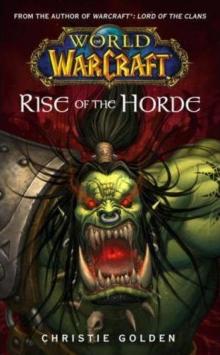 Rise of the Horde wow-2
Rise of the Horde wow-2 Dark Disciple
Dark Disciple Ghost Dance
Ghost Dance The Shattering
The Shattering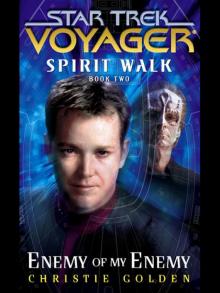 Spirit Walk, Book Two
Spirit Walk, Book Two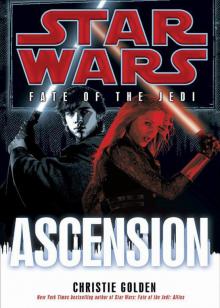 Star Wars: Fate of the Jedi: Ascension
Star Wars: Fate of the Jedi: Ascension Star Wars: Fate of the Jedi V: Allies
Star Wars: Fate of the Jedi V: Allies The Enemy Within
The Enemy Within Kindred Spirits
Kindred Spirits The Farther Shore
The Farther Shore Star Trek: Hard Crash (Star Trek: Starfleet Corps of Engineers Book 3)
Star Trek: Hard Crash (Star Trek: Starfleet Corps of Engineers Book 3) Twilight
Twilight